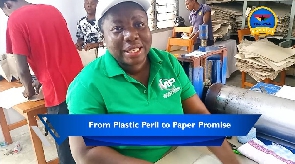Correspondence from Western Region:
In recent years, the environmental impact of human activities has become a pressing concern, driving a global movement toward sustainability and responsible consumption.
One area that has drawn considerable attention is the use of polythene bags, notorious for their harmful effects on ecosystems and human health, a major cause of climate change in Ghana and the world at large.
Speaking to GhanaWeb's Thomas Tetteh in an interview, a Lecturer and Researcher at the Department of Environmental and Safety Engineering at the University of Mines and Technology, Dr Eric Gyimah explained climate change as a significant change in average weather condition of a region or an area for a longer period time.
“If we are talking about what cause climate change, then we pinpoint it on what is called greenhouse gases. Now, these greenhouse gases, what they do is that they form a blanket and they trap heat that is leaving the earth surface into the outer space back onto the earth surface. And the net effect is that it then warms the globe (global warming), which means that the globe has become warmer than it’s expected to be” he said.
According to him climate change is more global than local. Human activities induce greenhouse gases into the atmosphere. These gases predominantly are the carbon dioxide, methane, water vapor, and other trace gases in the atmosphere. But what is what has become the major contributor to greenhouse gas is carbon dioxide production which is caused by human activities such as industrialization.
“Naturally, we have carbon dioxide in the atmosphere at a certain level which is okay. But above the expert level, become very detrimental to human life and that is a contributor to climate change” he explained.
Explaining the contributing factors to climate change, Dr Gyima noted that the use of plastic bags and their huge production is a major contributing factor.
He explained that “because these plastic bags are not biodegradable, they end up in the oceans causing harm to aquatic organisms in the sea. The presence of these plastics on the landfill sites emits into the atmosphere causing harm to the environment”.
In response to this mounting crisis, a significant shift is underway, as communities and businesses worldwide are recognizing the need to replace polythene bags with more eco-friendly alternatives. Prominent among these alternatives are paper bags, which offer a sustainable solution without compromising convenience and utility.
To this end paper bag company; Mending Papers has been commissioned in Tarkwa to produce paper bags in large quantities to contribute towards the elimination of polythene bags in the system, using agro products.
The company uses plantain trees, rice straw, and maize husk in producing paper bags.
In order to make the paper, the plantain trees are shredded into pieces and dried. The dried shredded plantains tree is boiled for about four to five hours and blended into pulp with a mechanized blender made by an engineer. The pulp is mixed with water in a big container. They then use a net tray to separate the pulp from the water by scooping it from the container and dried with a solar dryer or the sun. The dried pulp becomes the paper. The paper is put in a machine to straighten it to become smooth making it easier for the bag making.
The effects of polythene bags
Speaking to GhanaWeb, the Chief Executive Officer of Mending Papers, Madam Joana Arthur noted that she was motivated to start producing paper bags due to the many presence of polythene bags in the system, destroying the environment and contributing to climate change.
Improper disposal of polythene bags, such as littering or improper waste management, contributes to visual pollution in Ghana. Plastic bags often end up in streets, water bodies, and natural habitats, creating an unclean environment.
These polythene bags have a tendency to block drainage systems when improperly disposed of. This leads to flooding during heavy rains, as the water cannot flow freely. Flooding can cause property damage and disrupt transportation infrastructure.
When polythene bags are not disposed of properly, they can contaminate soil and water. Plastic bags take a long time to decompose, and during this process, they release harmful chemicals into the environment. These chemicals can seep into the soil and water, posing a threat to plants, animals, and human health. This informed Joana’s decision to produce paper bag in order to get eliminated the polythene bags from the system gradually.
According to a report by the Center for International Environmental Law by 2050 global warming is going to be severe, an indication that there will be terrible climate change in the year ahead.
The SNV Support
Mending Papers which started very small has now received support from SNV Netherlands which has contributed immensely to more production.
Mending papers was one of the five businesses to receive a matching grant from the 2021 GrEEn Innovation Challenge by the GrEEn Project of SNV Netherlands, to create jobs and increase production from 50 bags to 300 bags after being awarded a EUR 25,000 (equivalent of GHS 175,000) by the European Union as part of the Project.
Through this grant, Joana Arthur has purchased a solar dryer, sunk a borehole, and new equipment to scale paper production of the company.
According to the Senior Incubation Acceleration Advisor of SNV Ghana, Geneviv Parker-Twum, SNV Ghana got to know of Joana Arthur and her business on social media, where she showcased her paper bags “which fell in line with the business, what we have been looking forward to supporting”.
She said “we engaged her and brought her into our incubation programme at the UMaT Incubation Hub(U-Hub), where she successfully completed the GrEEn innovation challenge, and since then we have been supporting her. We realized that she had been struggling to get quality output due to lack of equipment, so we supported her to mechanize the business so she can produce more.”
Joana Arthur hopes to achieve her dream of seeing every Ghanaian accept the use of paper bags, so that the business can move all over Ghana and the world at large because paper bags are not harmful to the environment.
According to Dr Eric Gyimah, going in for paper bags instead of plastics is one of the sure ways of reducing climate change.
This report is produced in fulfilment of the UNESCO & CIJ London Climate Change in News Media project facilitated by the Centre for Journalism Innovation and Development.
General News of Monday, 12 June 2023
Source: www.ghanaweb.com













